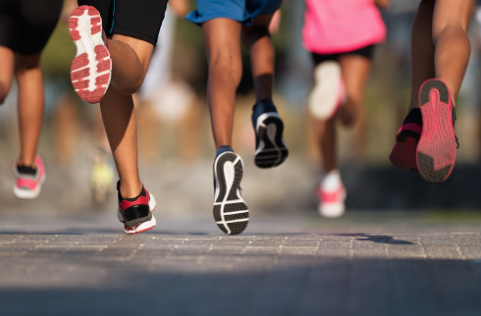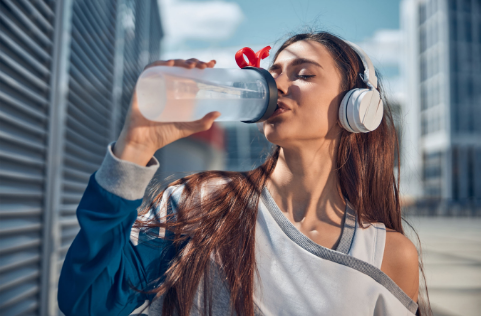It is all to often that we hear a narrative that goes something like this:
You get into running for the fun of it. Maybe all your friends are on the cross-country team, and you don’t want to experience FOMO. Perhaps running was your go-to activity of choice during the pandemic when your gym was closed. Or, maybe you’ve been running your whole life and you run regularly!
For some, running is a hobby; a release at the end of the day, a way to experience the outdoors, or even a social activity. For others, it can be a double-edged sword. It can be a means of overexercising or a detrimental piece of an eating disorder. With there being such a strong correlation between running and eating disorders, we would like to highlight signs of disordered eating in an athlete as well as tips to fuel your body for sport.

Why is there a correlation between running and eating disorders?
It is well established that there is, in fact, a correlation between running and eating disorders (1, 2, 3). There are a number of reasons that this may be the case.
If you have been around a competitive running community before, you may have heard the cringe-worthy term “thin to win.” This is a phrase that refers to the *false* belief that a lower body weight leads to being faster. This has been disproven time and time again (3). In fact, being under-fueled for sport can lead to a whole host of issues, including Relative Energy Deficiency in Sport (RED-S). However, on running teams and in some running communities, there is a culture of disordered eating that is driven by this “thin to win” mentality.
Aside from the cultural aspects of running that are correlated with eating disorders, we can’t forget that any type of physical activity increases one’s energy needs overall. When running on a regular basis, it can be easy to underestimate your energy needs. Unfortunately, many athletes, particularly younger athletes, do not have the proper knowledge needed to support their high levels of activity. This leads to many athletes unintentionally under-fueling on a regular basis, therefore resulting in weight loss.

Signs of eating disorders in runners
While eating disorders can look very different from person to person, there are a few signs that may indicate a form of disordered eating in an athlete - specifically a runner. If you suspect that you are experiencing an eating disorder based on the list below, don’t hesitate to reach out to our team of registered dietitians for 1-1 counseling, or join the NourishRX PATH for Eating Disorder Recovery.
Physical Signs
- Increased fatigue throughout the day or sleeping more
- Feeling constantly sore
- Decline in performance
- Lightheadedness or dizziness
- Injuries such as stress fractures or muscle tears

Behavioral Signs
- Increased isolation from friends and family
- Preoccupation with food
- Training more that what is prescribed by a coach
- Increased irritability
- Tracking food or counting calories
How to fuel properly for running
No matter what level of training you are doing, it is crucial that you are fueling properly. Why, you ask? Underfueling can not only lead to a decrease in performance, but it can also lead to injury, decreased bone strength, irritability, depression, anxiety, or cardiovascular issues - all of which are components of RED-S.
In order to ensure that you are consistently performing at your best, take a look at these tips specifically for runners:
30 minutes before
Have a snack that contains carbohydrates and protein, and be sure to hydrate. This will give your body some quick energy to fuel your activity.
During Activity
If your run is longer than 1 hour, be sure to pack a source of carbohydrates with you! This could be gummies, sports gels, or Gatorade. The recommendation is to consume a serving of one of these items every 30-45 minutes during activity.

30 minutes after
Just like before your run, have a snack that contains carbohydrates and protein. This will help replenish the energy stores in your muscles, and help repair any routine muscular damage.
Throughout the Day
Consistently eat meals that contain protein, carbohydrates, and fat in order to give your body a constant stream of energy. We recommend eating a meal or snack every 3-4 hours throughout the day.
Here at NourishRX, we want to see you be the best that you can be. Part of that is ensuring that you are adequately fueled to do the things that you love on a daily basis. If you feel like your relationship with food is getting in the way of participating in sports, reach out for 1-1 nutrition counseling with our registered dietitians.
Comments Off on Running and Eating Disorders: Identifying Signs and Solutions